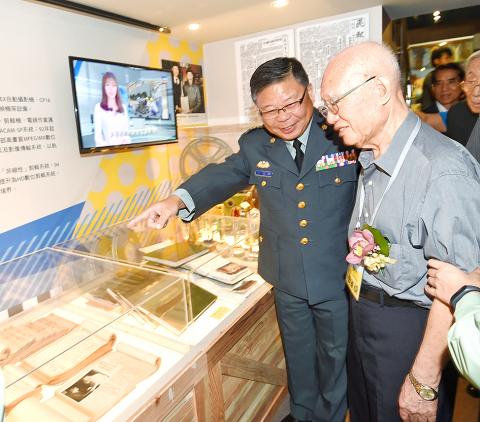Taiwan intends to take advantage of an annual defense conference with the US that was to open yesterday in Princeton, New Jersey, to seek Washington’s support for arms sales and cooperation opportunities with US defense companies, sources said.
Taiwan will seek backing for its weapons procurement proposals and cooperation with US defense manufacturers at the three-day US-Taiwan Defense Industry Conference, a source with direct knowledge of the matter said on condition of anonymity.
The efforts are necessary at a time when US President Donald Trump’s administration has yet to respond to Taipei’s request to purchase Lockheed Martin F-35 jets, or deliver on former US president George W. Bush’s pledge to sell the nation eight diesel-electric submarines, the source said.

Photo: Fang Pin-chao, Taipei Times
The US Department of State is expected to send officials “of some weight” to the conference, who are likely to meet with a Taiwanese delegation on the sidelines to talk about weapons procurement, the source added.
The conference is to focus on the US administration’s Northeast Asia policies and their potential effects on Taiwan’s defense.
It would also discuss the threats facing Taiwan and its response options, as well as how the nation could exploit China’s weaknesses in traditional and emerging domains — air, land, sea and cyberspace — according to information on the conference’s Web site.
Now in its 16th year, the conference is considered an important platform for dialogue on Taiwan’s national security needs, weapons procurement and defense cooperation with the US.
The Taiwanese delegation to the three-day conference is led by Deputy Defense Minister General Chang Guan-chung (張冠群), who is to deliver a keynote speech today.
Chang is scheduled to speak after introductory remarks by American Institute in Taiwan Chairman James Moriarty.
US Principal Deputy Assistant Secretary of Defense for Asian and Pacific Security Affairs David Helvey is also to give a keynote speech later in the day.
The discussions at the conference are to include input by Ian Easton, research fellow at US-based think tank Project 2049 Institute and author of The Chinese Invasion Threat.
Business representatives from Taiwan’s information security, shipbuilding and aviation industries are to join the discussions tomorrow.
The participants are to examine the potential implications of the Trump administration’s policies for developing business opportunities in the defense and security industries in Taiwan and the US.
The conference has been hosted by the US-Taiwan Business Council since 2002.

The US government has signed defense cooperation agreements with Japan and the Philippines to boost the deterrence capabilities of countries in the first island chain, a report by the National Security Bureau (NSB) showed. The main countries on the first island chain include the two nations and Taiwan. The bureau is to present the report at a meeting of the legislature’s Foreign Affairs and National Defense Committee tomorrow. The US military has deployed Typhon missile systems to Japan’s Yamaguchi Prefecture and Zambales province in the Philippines during their joint military exercises. It has also installed NMESIS anti-ship systems in Japan’s Okinawa

‘WIN-WIN’: The Philippines, and central and eastern European countries are important potential drone cooperation partners, Minister of Foreign Affairs Lin Chia-lung said Minister of Foreign Affairs Lin Chia-lung (林佳龍) in an interview published yesterday confirmed that there are joint ventures between Taiwan and Poland in the drone industry. Lin made the remark in an exclusive interview with the Chinese-language Liberty Times (the Taipei Times’ sister paper). The government-backed Taiwan Excellence Drone International Business Opportunities Alliance and the Polish Chamber of Unmanned Systems on Wednesday last week signed a memorandum of understanding in Poland to develop a “non-China” supply chain for drones and work together on key technologies. Asked if Taiwan prioritized Poland among central and eastern European countries in drone collaboration, Lin

TRAGEDY STRIKES TAIPEI: The suspect died after falling off a building after he threw smoke grenades into Taipei Main Station and went on a killing spree in Zhongshan A 27-year-old suspect allegedly threw smoke grenades in Taipei Main Station and then proceeded to Zhongshan MRT Station in a random killing spree that resulted in the death of the suspect and two other civilians, and seven injured, including one in critical condition, as of press time last night. The suspect, identified as a man surnamed Chang Wen (張文), allegedly began the attack at Taipei Main Station, the Taipei Fire Department said, adding that it received a report at 5:24pm that smoke grenades had been thrown in the station. One man in his 50s was rushed to hospital after a cardiac arrest

ON ALERT: Taiwan’s partners would issue warnings if China attempted to use Interpol to target Taiwanese, and the global body has mechanisms to prevent it, an official said China has stationed two to four people specializing in Taiwan affairs at its embassies in several democratic countries to monitor and harass Taiwanese, actions that the host nations would not tolerate, National Security Bureau (NSB) Director-General Tsai Ming-yen (蔡明彥) said yesterday. Tsai made the comments at a meeting of the legislature’s Foreign Affairs and National Defense Committee, which asked him and Minister of National Defense Wellington Koo (顧立雄) to report on potential conflicts in the Taiwan Strait and military preparedness. Democratic Progressive Party (DPP) Legislator Michelle Lin (林楚茵) expressed concern that Beijing has posted personnel from China’s Taiwan Affairs Office to its